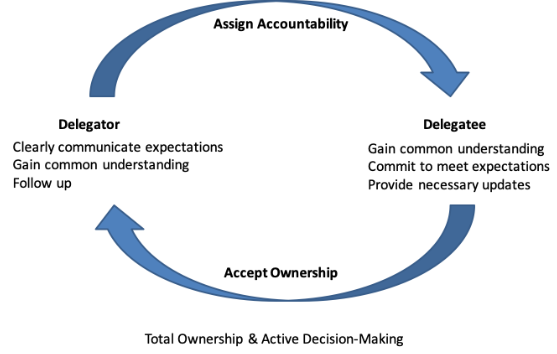Leaders knowing how to delegate is about getting others to perform. Great leaders can get others to perform great things. Some of the essential skills for leaders are motivation, communication, and delegation. Of these, delegation seems to be the simple one. Tell someone to do something. This simple answer is not generally very effective. A real leader needs to know how to delegate effectively.
Delegation is the act of communicating with someone a task or deliverable you want them to accomplish. This can be a messy endeavor with equally messy results or no results at all. Here, I will discuss an effective model of delegation, based in the Total Ownership philosophy, that presents delegation in the total ownership philosophy. Leadership delegation, to be effective, needs to be a negotiation.
So how do we typically delegate a task? Delegation begins with the delegator assigning accountability. This is commonly done by simply instructing the delegatee to perform the task. Delegation is complete when the task is complete. Boy, that was simple! How often has it been that simple?
True leaders know how to delegate. To explain the model, I will focus on the responsibilities of each party in the process, beginning with the delegator. To assign responsibility, the delegator needs to have a clear understanding of the task to be performed, or the results desired. These expectations need to be clearly communicated to the delegatee. This is the first responsibility of the delegator.
Figure 1 – Delegation Cycle
The next responsibility falls on both parties, to gain a common understanding. The delegator cannot expect anyone to follow through on something not communicated and understood. The delegatee has a responsibility to make sure they have a full understanding of these expectations. Questions must be asked to clarify any concerns the delegatee may have with the expectations.
Once there is a common understanding, the delegatee should evaluate the assignment to make sure he or she feels the expectations can be met. If the delegatee is satisfied that he or she is capable of delivering the expected deliverable, the delegatee will commit to meeting the expectations. As with a contract, the commitment will be qualified if necessary to ensure agreement. This commitment is called accepting ownership. Now it is up to the delegatee to deliver on the commitment.
There is one more responsibility for each party in the delegation cycle. It is the responsibility of the delegator to periodically follow up on the status of the expectations. This is not to ‘sit over the shoulder’ till the task is performed; we all know how annoying that can be. This responsibility ensures that the person performing the task knows if there are any changes to the expectations, and to satisfy themselves that progress is being made.
Similarly, the delegatee has a responsibility to update the person who assigned the task as to the progress. This update can include concerns, risks, additional questions, and to inform of decisions made during the process of delivering the expected task. There is a fine balance that will be worked out between the two parties for updates and the follow-up. Open communication is necessary to find this balance.
The total ownership philosophy tells us that the person who is assigned and accepts the task has the authority and responsibility to deliver the commonly agreed expectations. The delegator will support them by allowing them to do what is necessary to complete the task. The delegatee will receive the recognition or be held accountable for the results. This model presents the Delegation Cycle using this Total Ownership philosophy.
Knowing how to delegate is an essential leadership skill and this model of leadership delegation has been effective in ensuring the intended tasks are completed as expected. As leaders effectively delegating tasks, acts like a force multiplier. More work can be accomplished to support the vision or goals of the leader. Delegation is rooted in strong two-way communication. It is essential to learn delegation if one is to become a great leader.
Similar Content:
-
To run complex organizations project leaders MUST be bold
-
How to be a great project leader
-
Things great project leaders do each day


